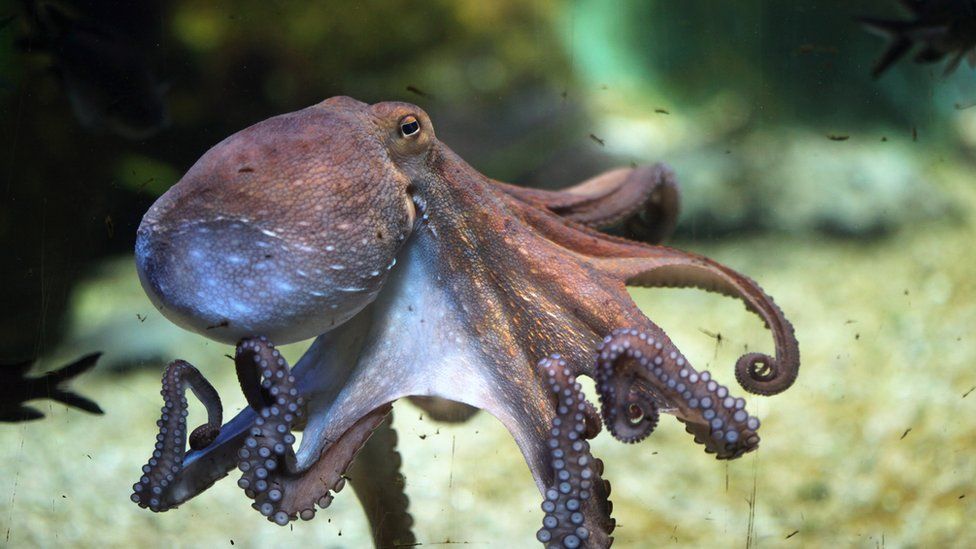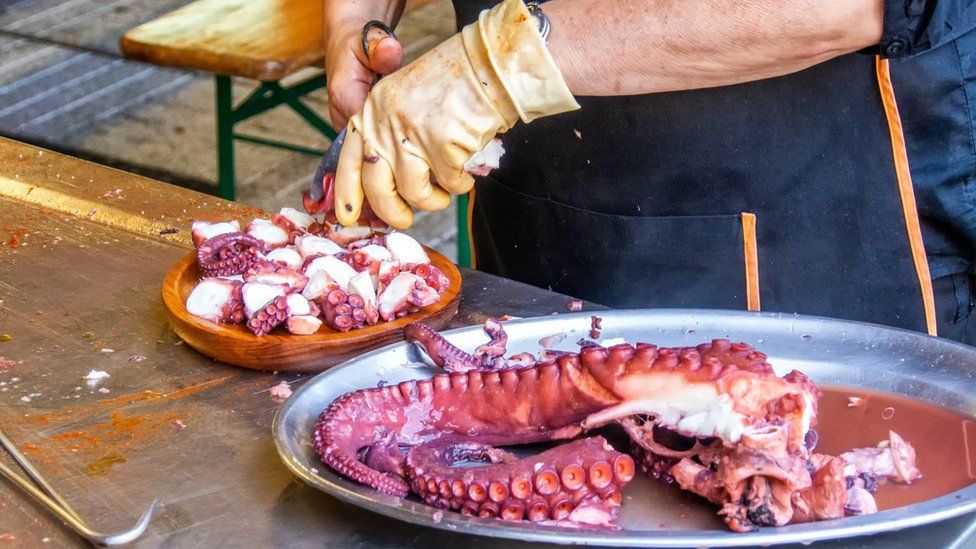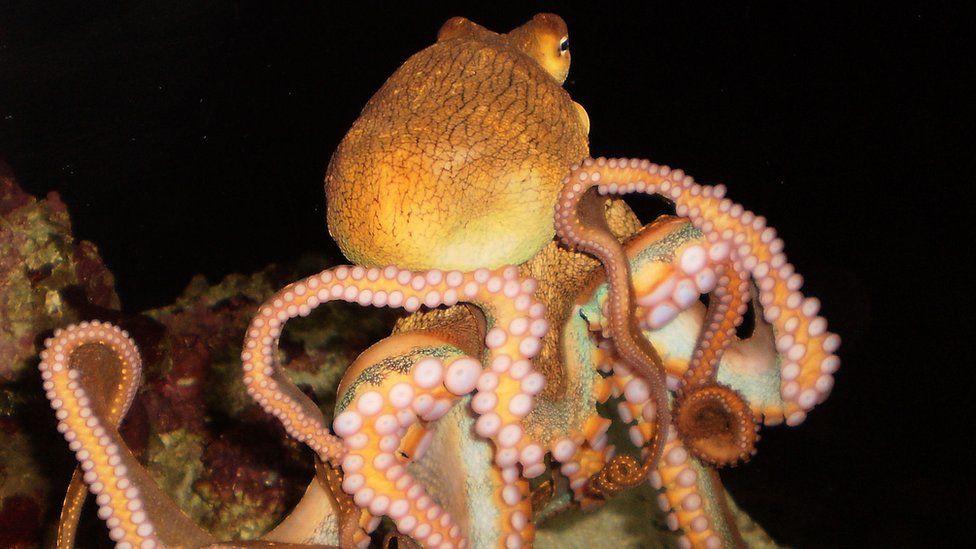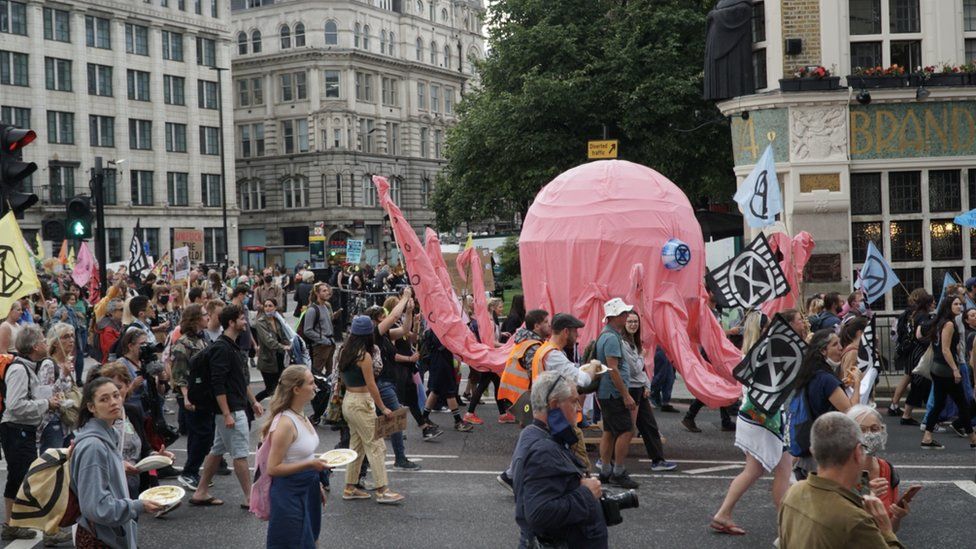Methods used on the Spanish farm would be “cruel” to such intelligent animals say experts, as details emerge.
 Image source, wrangel
Image source, wrangelA plan to build the world’s first octopus farm has raised deep concerns among scientists over the welfare of the famously intelligent creatures.
The farm in Spain’s Canary Islands would raise about a million octopuses annually for food, according to confidential documents seen by the BBC.
They have never been intensively farmed and some scientists call the proposed icy water slaughtering method “cruel.”
The Spanish multinational behind the plans denies the octopuses will suffer.
The confidential planning proposal documents from the company, Nueva Pescanova, were given to the BBC by the campaign organisation Eurogroup for Animals.
Nueva Pescanova sent the proposal to the Canary Islands’ General Directorate of Fishing, which has not responded to a BBC request for comment.
Octopuses caught in the wild using pots, lines and traps are eaten all over the world, including in the Mediterranean and in Asia and Latin America.
The race to discover the secret to breeding them in captivity has been going on for decades. It’s difficult as the larvae only eat live food and need a carefully controlled environment, but Nueva Pescanova announced in 2019 that it had made a scientific breakthrough.
The prospect of intensively farming octopus has already led to opposition: Lawmakers in the US state of Washington have proposed banning the practice before it even starts.
Nueva Pescanova’s plans reveal that the octopuses, which are solitary animals used to the dark, would be kept in tanks with other octopuses, at times under constant light. The creatures – the species octopus vulgaris – would be housed in around 1,000 communal tanks in a two-storey building in the port of Las Palmas in Gran Canaria.
They would be killed by being put in containers of water kept at -3C, according to the documents.
Currently there are no welfare rules in place, as octopuses have never been commercially farmed before. However studies have shown that this method of slaughtering fish using ‘ice slurry’ causes a slow, stressful death. The World Organisation for Animal Health says it “results in poor fish welfare” and the Aquaculture Stewardship Council (ASC) – the leading farmed seafood certification scheme – is proposing a ban unless fish are stunned beforehand.
Some supermarkets have already moved away from selling fish that have been killed using ice, including Tesco and Morrisons.
Prof. Peter Tse, a neurologist at Dartmouth University, told the BBC that “to kill them with ice would be a slow death … it would be very cruel and should not be allowed.”
Adding that they were “as intelligent as cats” he suggested that a more humane way would be to kill them as many fishermen do, by clubbing them over the head.

Image source, Gerardo G. Mourín – ggmourin@gmail.com
To supply “premium international markets” including the US, South Korea and Japan, Nueva Pescanova wants to produce 3,000 tonnes of octopus a year. This equates to around one million animals, with some 10-15 octopuses living in each cubic metre of tank, according to campaign group Compassion in World Farming (CiWF), which has studied the plans.
Nueva Pescanova estimates in its documentation that there will be “a mortality rate of 10-15%”.
Creatures that feel ‘pain and pleasure’
Jonathan Birch, associate professor at the London School of Economics, led a review of more than 300 scientific studies which he says shows that octopuses feel pain and pleasure. It led to them being recognised as “sentient beings” in the UK’s Animal Welfare (Sentience) Act 2022. Prof Birch and his co-authors believe that high-welfare octopus farming is “impossible” and that killing in ice slurry “would not be an acceptable method of killing in a lab”.
“Large numbers of octopuses should never be kept together in close proximity. Doing this leads to stress, conflict and high mortality … A figure of 10-15% mortality should not be acceptable for any kind of farming.”
In a statement to the BBC, Nueva Pescanova said: “The levels of welfare requirements for the production of octopus or any other animal in our farming farms guarantee the correct handling of the animals. The slaughter, likewise, involves proper handling that avoids any pain or suffering to the animal …”
In the wild, octopuses are fiercely territorial agile hunters. Nueva Pescanova is proposing that the farmed animals be fed with industrially produced dry feed, sourced from “discards and by-products” of already-caught fish.
The tanks would be filled with seawater piped in from an adjacent bay. The tanks would be different sizes for the different phases of the octopuses’ life, with the salinity and temperature closely controlled.
The initial brood of 100 octopuses – 70 males and 30 females – would be taken from a research facility, the Pescanova Biomarine Centre, in Galicia, northern Spain.
The plans state that the company has achieved a level of “domestication” in the species and that they do not “show important signs of cannibalism or competition for food”.
Elena Lara from CiWF called on the Canary Islands authorities to block construction of the farm, which she said would “inflict unnecessary suffering on these intelligent, sentient and fascinating creatures”.
Reineke Hameleers, CEO at Eurogroup for Animals added that the European Commission was currently reviewing its animal welfare legislation and had a “real opportunity” to “avoid terrible suffering”.

Image source, Gabrielle Yap / EyeEm
Along with the welfare of the octopuses, CiWF has concerns around the wastewater produced by the farm, which would be pumped back into the sea. Octopuses produce nitrogen and phosphates as waste. “The water entering and leaving the plant will be filtered so that it will have no impact on the environment,” Nueva Pescanova told the BBC.
Around 350,000 tonnes of octopus are caught each year – more than 10 times the number caught in 1950 – which is putting pressure on populations. Nueva Pescanova stated that “aquaculture is the solution to ensuring a sustainable yield” and that it would “repopulate the octopus species in the future.” However conservationists believe farming them would lower the price, potentially creating new markets.
Nueva Pescanova emphasised to the BBC that it dedicated “great efforts to promote responsible and sustainable performance throughout the value chain to ensure that best practices are adopted.”
The government of Gran Canaria has not responded to a request for information.

Image source, Animal Rebellion
Follow Claire on Twitter